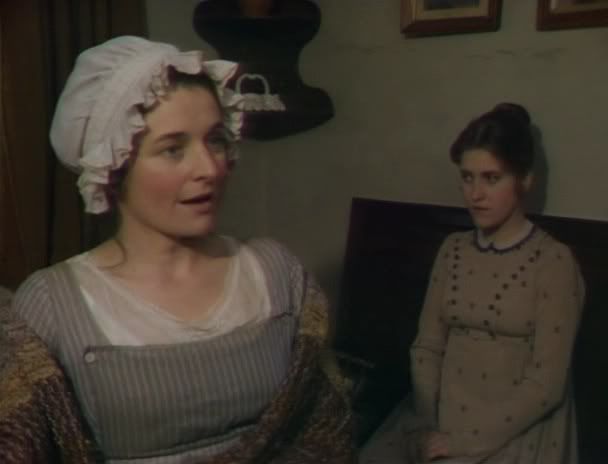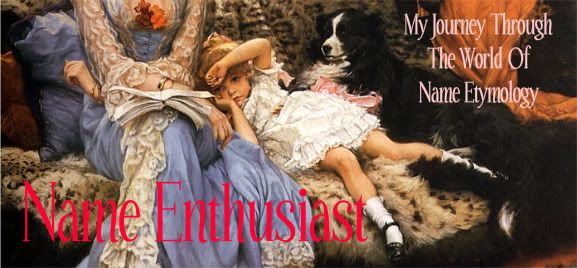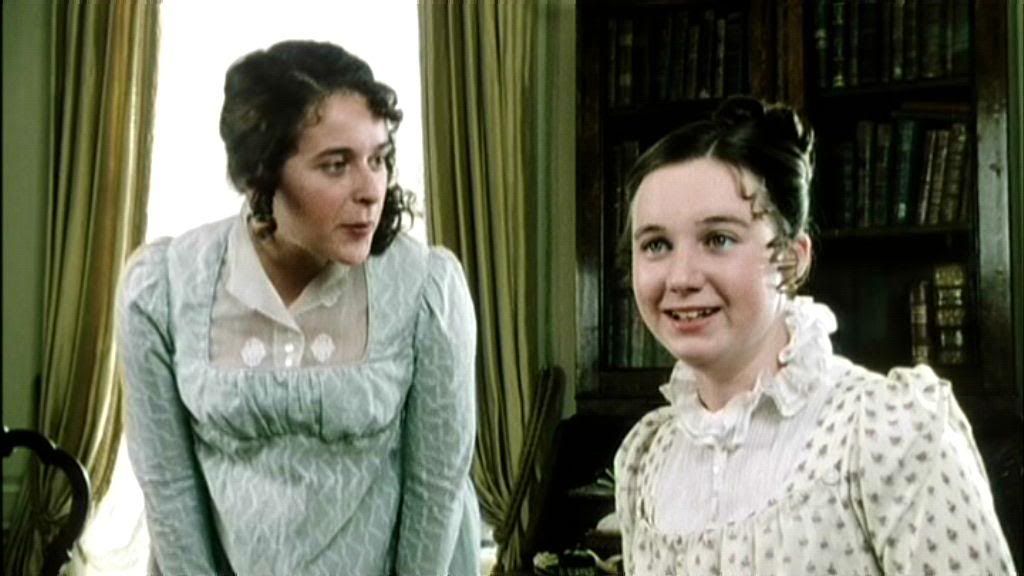This post is sort of a request but I've also been wanting to investigate the theme of English Nicknames for a while now. Back in February I commented on my blogging friend Melody at Regency Delight ~Jane Austen, etc.~ posted Sense and Sensibility: Nancy or Anne? in which she asked why Miss Steele, sister of Lucy Steele in Jane Austen's Sense and Sensibility is sometimes called Anne and sometimes called Nancy.
The easy answer is that her Christian name is Anne and her nickname is Nancy, but this leads to the question why is Nancy a common nickname for Anne? And for that matter why is Catherine Bennet in Pride and Prejudice always called Kitty and why is Fanny Price of Mansfield Park named after her mother Frances but she's never called Frances in the book?
Those folks in the United Kingdom have always seemed to me to be quite fond of nicknames, shortening and abbreviating. But this leads to the question where did these "common" nicknames actually come from? To answer this question some research on English nicknames and their origins was in order! It took me a while to find a good source but once I did I found more information than I'd ever dreamed of! Reading NameNerds.com's terrific article Where Do Our Nicknames Come From? was an enlightening experience for me, one of those "ah ha!" moments. I highly recommend reading their article but I'll be quoting heavily from them here too.
Nicknames and terms of endearment have been used in almost every culture world wide but common English nicknames we have today have their roots in the Middle Ages.
"Way back in the middle ages, a common way to make diminutives of names is to add -kin, -in, or -cock to the end. Thus, John became Jankin or Jenkin, which eventually became shortened to Jakin, which in turn became Jack. Many of these names today survive in surname form (i.e., Jenkins, Wilkins, Perkins, Tompkins, Wilcox, Johncox, etc.) though there are not many used as first names anymore." - NameNerds.comThe easy answer is that her Christian name is Anne and her nickname is Nancy, but this leads to the question why is Nancy a common nickname for Anne? And for that matter why is Catherine Bennet in Pride and Prejudice always called Kitty and why is Fanny Price of Mansfield Park named after her mother Frances but she's never called Frances in the book?
Those folks in the United Kingdom have always seemed to me to be quite fond of nicknames, shortening and abbreviating. But this leads to the question where did these "common" nicknames actually come from? To answer this question some research on English nicknames and their origins was in order! It took me a while to find a good source but once I did I found more information than I'd ever dreamed of! Reading NameNerds.com's terrific article Where Do Our Nicknames Come From? was an enlightening experience for me, one of those "ah ha!" moments. I highly recommend reading their article but I'll be quoting heavily from them here too.
Nicknames and terms of endearment have been used in almost every culture world wide but common English nicknames we have today have their roots in the Middle Ages.
- Francis = Frankin, Frank (Jane Austen's brother Francis "Frank" Austen and Emma character Frank Churchill)
- Gilbert = Gibbin
- Henry = Hawkin, Henkin, Hankin, Hank, Henecok
- John = Jankin, Jenkin, Jakin, Jack, Johncock
- Lawrence = Larkin
- Nicholas = Colin, Cole (this answers some of my Colin origin questions!)
- Robert = Robin, Hobkin (like Robin Hood, Robert of Locksley)
- Simon = Simkin
- Thomas = Tonkin, Tomkin, Tonk
- William = Wilkin, Wilk, Wilcock
Other style of nicknames in the Middle Ages were: "Rhyming names also have been popular diminutive forms of names. For example, Robert spawned not only Rob, but Hob and Dob as well, which in turn became Hobkin and Dobkin." - NameNerds.com
Other examples are:- Andrew = Andy, Dandy
- Robert = Rob, Bob, Hob, Dob, Nob
- William = Will, Bill
For example:
- Barbara = Babs
- Dorothy = Dolly
- Mary = Moll, Molly, Polly, Maisie, Maidie (Molly Gibson of Mrs. Gaskell's Wives & Daughters is named after her mother Mary)
- Margaret = Maggie, Meg, Meggie, Peg, Peggy
- Sarah = Sally, Sadie (Answers the conumdrum of Catherine Morland's sister's name in Chapter 2 Northanger Abbey!)
- Frances = Fanny
- Brigid = Biddy
- Teresa = Tess, Tessa, Tessie (like in Thomas Hardy's Tess of the D'Urbevilles)
"-ch and -th sounds were pronounced like "k" and "t" in these days as well. Surviving today are the pronunciations of Thomas, Theresa and Anthony (pronounced like Antony in Britain still). Richard was pronounced more like Rickard, thus giving rise to the pet forms Rick, Hick, and Dick."
Some examples:
- Dorothy = Dot, Dodie
- Elizabeth = Bess, Bessie, Betty (and Betsey like Fanny Price's sister in Mansfield Park and other characters!)
- Catherine = Kit, Kitty, Kate (like Kitty Bennet of Pride and Prejudice!)
- Christopher = Kit
- Theodore = Ted
- Theresa = Tess, Tessie
For example:
- Ann = Nan, Nannie
- Edward = Ned
- Helen = Nell, Nelly
Like I said, this article answered so many questions for me!
But there's just a few more questions lurking in the back of my mind.
If there are all these cool nicknames why do some of Jane Austen's characters (especially heroines) have nicknames and some do not?
Similar to today nicknames in Jane Austen's day were entirely up to the individual and the family.
A lot of times the child would be named after a family member and often a nickname would be used for the young child to distinguish one from the other (i.e. Molly Gibson of Elizabeth Gaskell's Wives and Daughters is said to have been Christened Mary after her mother but was called Molly to tell them apart, when her mother died she kept being called Molly because it suited her). Often parents would Christen their child after a wealthier relative and make them godfather or godmother of the child in the hopes that the wealth relative might favor their namesake with wealth. I believe this is the case with George Wickham in Pride and Prejudice, his godfather the elder Mr. Darcy mentioned Wickham in his will. (This and the fact that his young daughter was named Georgiana leads me to believe that the elder Mr. Darcy's first name was probably George!) In Mansfield Park Fanny's youngest sister Betsey is goddaughter to their Aunt Norris (which leads me to believe they shared the common Christian name Elizabeth) but young Betsey is less fortunate than other godchildren receiving from her stingy aunt only the apologizes of not sending her a prayer book!
Names always tell a story, the naming of a child can tell you volumes about their parent's hopes and dreams for them. I believe Jane Austen knew this and chose the names of her characters very carefully. If you look closely at the sounds, histories and meanings of her character's names you'll find that most of the names suit the character's personality to a tea!

Why are some characters only called by their nicknames? do these characters even have proper Christian names?
Like I said before a lot of children who were named after family members often were given nickname to distinguish them from their relatives. Some children would grow into their full names but some would find that their nickname suited them throughout their lives. (Example: In a letter to a relative soon after Jane Austen's birth her father called his daughters Cassie and Jenny but we find in their teens and early twenties "Jenny" is never in use in family letters to mean Jane but Jane Austen sometimes called her sister "Aunt Cassie" when writing to her nieces and nephews.)
Why is Catherine Bennet called Kitty and Catherine Morland is never called so? Well, perhaps Kitty Bennet was named after her mother and so they always use her nickname to distinguish, or perhaps she's named after her Aunt Phillips. Perhaps Catherine Morland never needed a nickname because she didn't live close to a relative she was named after. Why is Anne Steele usually called Nancy and Anne Elliot is never called by a nickname? Perhaps she is named after a family member but then again their names may tell us more about their stations in life. Nancy Steele is from a humble Devonshire family while Anne Elliot's family is among the nobility of England and Ireland! To Sir Walter Elliot Anne was the name of Queens and royalty so in his eyes it suited his daughter better.
Characters like Fanny Price who are only ever called by the nickname would most certainly have had full Christian names even if they aren't mentioned in the novels. Most of Jane Austen's characters would have had a faith association that required in proper society that a child be Christened otherwise it would be considered that they didn't legally have a name. Among the middle and upper classes that Jane Austen associated with there were definitely names that were considered acceptable as Christian names and those that were not, names have even stricter connotations than they do now. A nickname like Sally, Jack, Fanny or Ned would not have been considered a "proper Christian name". Therefore Fanny would have been legally Christened Frances Price, but her family called her Fanny. It tells volumes of her relative's thoughts about her that when she is taken into their upper class society she is not raised to the rank of a Frances but is kept at the lowly positions of "just Fanny Price". I personally think the nickname suits the meek character better and Jane Austen must have too!
A few other observations:
- Few Biblical names were accepted in the upper classes of Jane Austen's day, perhaps because they were still associated with the Puritains, Quakers and other pious religious groups who scoured their Bibles for the names of saints and virtues. Biblical names were often considered plain and used more frequently among the lower classes. Anglicized versions such as Anne (Anna), Elizabeth (Elisabeth), Jane (John and Joanna), Susan (Susana) and Maria (Mary) were more frequently used.
- Names were very much linked with their origins so it could be assumed that if you had a "foreign" name that you would probably be a foreigner.
- Flower names didn't come into fashion until the late 1800's so it would seem odd for a girl to be named Violet or Lily.
- Meanings of names, their histories and associations (social, political, religious) were almost always taken into account when parents named their children. Jane Austen plays on this language of names from time to time in her novels.
I hope this answers some of your questions as it has mine about the whys and wherefores of English nicknames and Jane Austen's usages of them in her novels.
In a few days I'm hoping to post a fuller list of names and their common nicknames so be on the look out for that!
Your Resident Name Enthusiast,
Miss Laurie :)



6 comments:
For Mel or Melody, do you think this article would be of interest to other Jane Austen fans?
Great post! Wow! So nice and informative! I will definitely be linking it to my post.
I'm glad to know that flower names weren't in vogue until late 1800s! I like using flower names in books sometimes, so it's good to know. :)
Well, considering how many people tend to look up the Nancy/Anne thing, I do think it would be of interest to other Jane Austen fans. =)
I loved this post and I definitely think it would interest other Jane Austen fans!
I tried to research about this when I was trying to find out whether or not Fanny's 'real' name was Frances but none of the information I found answered my questions as perfectly as this post. I can see that it must have taken a lot of time to both find the information/articles and to write this up so thank you so much!
I too will link this post (if you don't mind) when I post up my new Jane Austen name poll.
Thanks again, this post was lovely!
Mel :)
Thank you ladies! Because of your encouragement I'll be posting about this subject on Old-Fashioned Charm. Thanks for linking to me!
Mel, I forgot to link to your posts about the heroes / heroines names like I was planning to. I can only say that it was after 2am when I finally finished this post! :)
Stupendous post! Absolutely fascinating and intriguingly informative.
I have never seen your blog before - it's most impressive in every way, and a great credit to you. The illustrations are a delightful enhancement.
Fascinating stuff. I knew that Nan or Nancy were nicknames for Anne, and until the Royal wedding last year, a lot of people had no idea that Katie is short for Katherine, because it's more common as a name on its own these days in the UK. But I didn't know how these names came to be versions of each other. Thanks for this post. I find this sort of thing really interesting.
Post a Comment